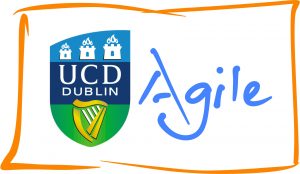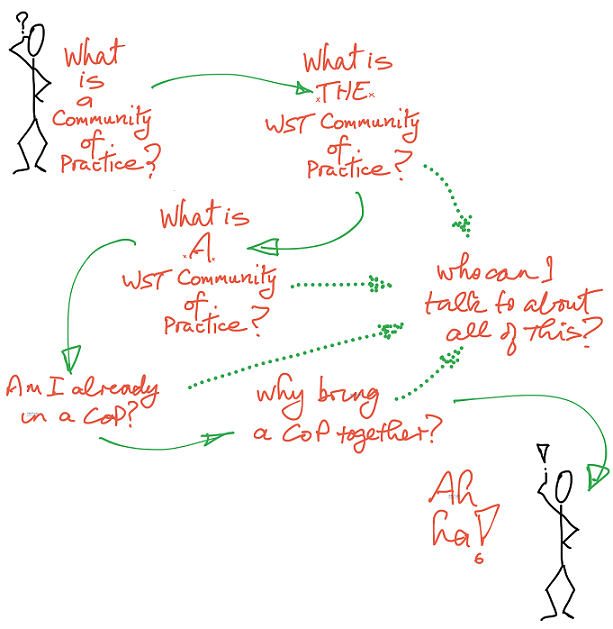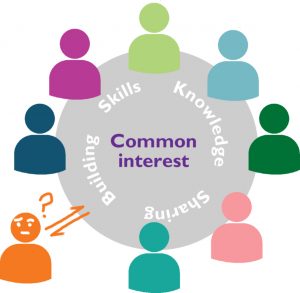What is a Community of Practice?
What is a Work Smarter Together community of practice?
It is a network of enthusiasts who share and create knowledge about a shared interest area.
Given the context is the work we do in UCD, the enthusiasts in question are colleagues in UCD and the shared interest area will be some aspect of how they work to shape and develop UCD. And at the heart of this is a commitment to building and sharing:
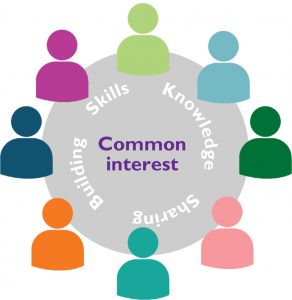 “A community of practice is a group of people who come together to build and share knowledge, to build and share skills, to build networks, and to build recognition.”
“A community of practice is a group of people who come together to build and share knowledge, to build and share skills, to build networks, and to build recognition.”
There are two perspectives to recognition – being recognised for your contribution to your community of practice, and the community of practice itself being recognised for its contribution to the University.
This kind of community might form around a common role or a common task or a common skill set or a common ‘customer’: it is the interests and focus of the group which shape the community of practice.
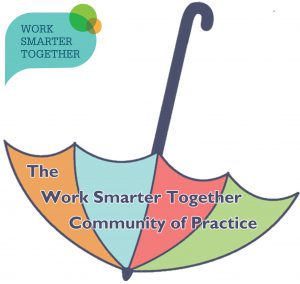 What is THE Work Smarter Together Community of Practice?
What is THE Work Smarter Together Community of Practice?
The Work Smarter Together Community of practice, formed in May 2017, is the group which runs the biennial University event that launched the CoP idea, that supports individual CoPs, that publishes the periodic WST, and that runs events like the annual July summer school.
The shared interest of this group is in celebrating collaboration and creativity in UCD and finding ways to support people who are active in this way – a community of practice is a WST CoP if it connects in with this.
How do I start a Community of Practice?
A CoP will:
- be focused on the work we do here in UCD in delivering education, research, administration and support
- be a gathering of enthusiasts from a common domain
- be committed to building and sharing knowledge
- be committed to building and sharing skills
- be committed to building networks
- be committed to building recognition
- meet periodically
- circulate news to its community periodically
This is a checklist, in effect, for what a WST CoP is. If you are thinking of forming a CoP then this checklist will help you see if you are consistent with the principles of UCD’s Work Smarter Together CoPs.
If you are thinking of starting a CoP, and the above list describes what you are thinking of doing/being, the contact UCD Agile – it is the University’s support vehicle for CoPs of this kind.
You can contact Agile at agile@ucd.ie, or by phone or email, if you would like to explore this further. (Click here for Agile’s contact details).
Where did the WST CoP come from?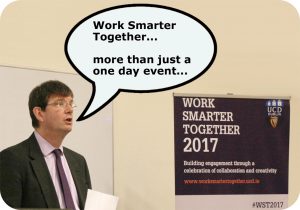
The Registrar and Deputy President, Prof Mark Rogers, announced it in his closing talk at WST 2017 and formally launched the WST CoP at an event on May 3 2017. He said:
“The community of practice idea is powerful because it focuses on learning, encourages experimentation, looks to empower individuals and groups, and is driven by the energy and interest its members.
And this is a key point – communities of practice come from the interests and needs of the community: they stand apart from how we formally organise the University.”
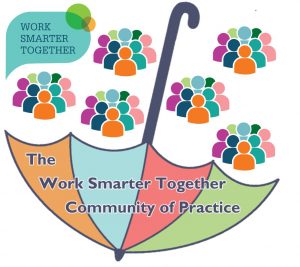
And what are the Work Smarter Together Communities of Practice?
We have THE Work Smarter Together Community of Practice – it runs the biennial event and other general WST events and publications.
We have A WST Communities of Practice is an individual community, drawn together as a great way to network with colleagues, to share experiences and knowledge, to develop an identity and to shape some particular aspect of the University ecosystem.
We have the WST Communities of Practice, all the various groups who come together in this way, with the WST Community of Practice – the umbrella University-wide community – being here to support the various communities of practice.
In short – one umbrella group supporting the various communities of practice that emerge.
This may sound a bit like a mix between a Danny Kaye sketch and Lord of the Rings… but we know what we mean.
What Work Smarter Together Communities of Practice are there already in UCD?
The Project Management Community of Practice was the latest to launch – on 23 October 2019. Other examples are the School Managers Community of Practice, the Mass Spectrometry Community of Practice and the PA Network. Some CoPs have arisen and died down – purpose met, they came to an end. It is the needs of the group that determine the life span.
Groups need to self-identify because calling yourself a community of practice is like saying “we are the kind of people who have a common interest in this area, want to share what we have learned and build on it, and want to connect with others with the same interest”. That is a “this is who we are and this is what we do” statement so the group needs to make it.
Am I already in a Community of Practice… but we just don’t call it that?
You could be.
A CoP is not about the label but what you do and what you are aiming for.
If you meet from time to time with colleagues to share experiences or thrash out ideas or look for inspiration/advice or share successes or build skills or get guidance… and this works for you and them… and you do this, or want to do this, more than just once, then maybe you are already in a ‘community’ looking at its ‘practice’ with a view to developing/sharing/networking. You may be in an ‘unconscious’ CoP and you did not know it!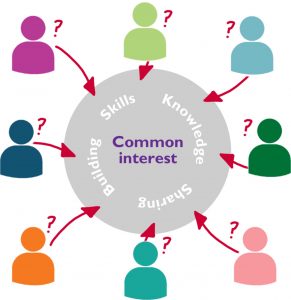
- Is there something – a skill to build, a role, a need to meet, a gap to close, a common ‘customer’ cluster – you share with others?
- Do you come together with some of them from time to time, or want to?
- Can you see the value of sharing your experience/skills with them?
- Can you see the value you might get from their experience/skills?
- Can you imagine it would be even better if you were able to work together or develop together?
Have you mentioned this to one of them – have you connected with someone on this?
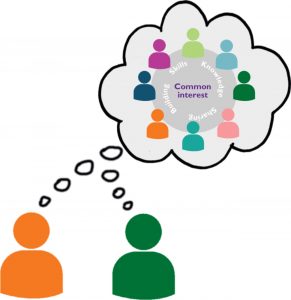 Who can I talk to about any of this?
Who can I talk to about any of this?
This is a people thing so who you talk to very much depends on your interest or need, or how well networked you are. Here are some routes for you…
Talk to someone you think you might be CoPing with already.
Talk to someone you have in mind who you want to draw into the idea of forming a CoP.
 Talk to some other people.
Talk to some other people.
And you can always talk to Michael or Olga or Donna in UCD Agile – UCD Agile sponsors WST and is the start-up driver of the CoP idea at the moment.
